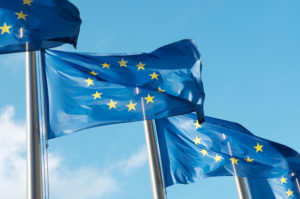Highlights from the Past Week
CW 11 / Monday, 13 to Thursday, 16 March: Plenary Sessions Week (Strasbourg);
DATA ACT I – PARLIAMENT READY FOR TRILOGUE: With the EU Data Act, the Commission aims to remove barriers obstructing access by consumers and business to data, and to thus promote innovation.
The draft legislation, adopted last week in the European Parliament in Strasbourg, is the Parliament’s position for negotiations with EU Member States. The Data Act regulates the handling of non-personalised data and is intended to enable new services – especially in the field of artificial intelligence, where huge amounts of data are needed for algorithm training. The planned innovations may also lead to better prices for after-sales services and repairs of connected devices. (see EP press release)
DATA ACT II – FURTHER PROGRESS IN COUNCIL EN ROUTE TO ENDORSEMENT: The telecom attachés discussed the Data Act last Tuesday and, according to Belgian telecom attaché Mieke De Regt, the Swedish Presidency has received the green light from Member States to proceed with the discussions at political level. This means that the dossier can be passed on to the deputy ambassadors.
Should the EU Member States be able to agree on their position this week, a first trilogue would be possible in the week of 27 March – with the aim of concluding the talks before the end of June.
EIDAS – PARLIAMENT ISSUES TRILOGUE MANDATE: The EU Parliament last week confirmed the negotiating mandate for talks with the EU Member States on the revision of the new eID Directive.
The scheme would allow citizens to identify and authenticate themselves online via the eID wallet without having to resort to commercial providers. It would also give users full control over their data and allow them to decide what information they want to share and with whom.
Following the plenary’s endorsement, the discussions with the Council on the final form of the legislation may begin immediately. The Council adopted its negotiating mandate in December 2022. (see EP press release)
MEDIA FREEDOM I – COUNCIL WILL ALLOW MEMBER STATES TO APPLY STRICTER RULES: In its compromise draft from 10 March (PDF), the Swedish Council Presidency explicitly gives the Member States the option of applying stricter rules than those provided for in the regulation. This is a response to a concern publicly expressed from the German side.
The autonomy of Member States is particularly perceptible in merger control, which could include takeovers by very large platforms. In parallel, this version gives more weight to the possibility for states to require media services to disclose information about their sources if that requirement is justified by an “overriding requirement in the public interest, in accordance with Article 52(1) of the Charter and in compliance with other Union law”. These proposals were discussed in the Audiovisual Working Group on 14 March. (see Contexte, paywall, FR)
MEDIA FREEDOM II – LACK OF MAJORITY IN THE COUNCIL ON SPLITTING THE PROPOSAL: The idea of splitting the regulation on media freedom into two parts and putting one part into a directive was supported only by Germany and Poland in the Audiovisual Working Group on 14 March.
The Swedish Chair urged the delegations to reject the idea of the Parliament’s rapporteur, S. Verheyen (EPP, DE), to turn part of the regulation into a directive.
This idea has generally been driven by Germany. From the beginning, the German federal states have made their opposition clear to any change in German media law and thus to any prospect of European harmonisation. The debate on the form of the text has overshadowed the substantive issues in the Council. The opinion of the Council’s legal service on the choice of legal basis for the text is expected at the end of the month. (see Contexte, Paywall, FR)
ARTIFICIAL INTELLIGENCE – PARLIAMENT’S PROPOSALS FOR A FRAMEWORK FOR CHATGPT: As is the case with the Council, the co-rapporteurs propose that AI systems for general use should be subject to proportionate requirements in the future regulation on artificial intelligence. However, they chose to already list these obligations without relying on the Commission.
Last week, D. Tudorache (Renew) and B. Benifei (S&D), the co-rapporteurs of the regulation on AI, circulated a first compromise text (PDF) that selects and specifies the requirements of the future text for these specific systems.
This text will now be discussed by the whole negotiating team of the Parliament. A first exchange in a technical meeting could take place as early as 20 March. (see Contexte, Paywall, FR)
E-EVIDENCE – VOTE POSTPONED: After the Committee on Civil Liberties, Justice and Home Affairs (LIBE) approved the provisional agreement on 31 January, the text is now expected to go to plenary for a final vote so that it can be adopted in the first reading as the European Parliament’s position.
The vote in plenary had been expected to take place during the sessions week of 13-16 March, but this did not come to pass. The next opportunity will be the sessions week of 17-20 April.
CYBER RESILIENCE – SCHEDULE IN THE LEADING COMMITTEE: The Industry Committee (ITRE) is leading the work on the Cyber Resilience Act in the European Parliament. In the meantime, the timetable has been published (PDF).
According to the timetable, rapporteur Nicola Danti (Renew Europe, Italy) will present the draft report to the committee for consideration on 25 April. MEPs would then have until 27 April to submit amendments to the text. The vote on the draft report and the amendments tabled is provisionally scheduled for 19 July.
INTERCEPTION – ECJ SEES NO LEGAL RIGHT TO FULL REIMBURSEMENT: Member States do not have to fully reimburse telecoms companies for the costs of interception operations, the European Court of Justice ruled last week on a case brought before it by the Italian Council of State (C‑339/21).
Several Italian operators had brought an action at national level after a 2017 decree reduced the reimbursement of costs for measures taken on behalf of judicial authorities by at least 50 per cent. They claimed that the fees provided for no longer fully covered the costs incurred.
However, the ECJ concluded in its judgment that EU rules neither require nor preclude the reimbursement of all costs incurred in the context of an interception measure, “provided that that legislation is non-discriminatory, proportionate and transparent”.
Relevant Publications, including from the EP Think Tank:
- Progress on the European Commission’s 2021-2027 digital education action plan (Briefing)
- Artificial intelligence in the agri-food sector: Applications, risks and impacts (Study)
- Ensuring machine safety in the digital age: Revision of the Machinery Directive (Briefing)
- Plenary round-up – March I 2023 (At a Glance)
- Key Issues in the European Council – State of play in March 2023 (Study)
A Selection of the EU Commission’s Consultations
- Further specifying procedural rules relating to the enforcement of the General Data Protection Regulation – Call for evidence: 24 February to 24 March 2023
- The future of the electronic communications sector and its infrastructure – Consultation: 23 February to 19 May 2023
- New product priorities for Ecodesign for Sustainable Products – Call for evidence, 31 January to 12 May 2023
- VAT in the digital age – Feedback on the regulation: 8 December 2022 to 4 April 2023
Outlook for the Current Week
You can find a list of the upcoming dates of the European Parliament here. The meeting calendar for 2023 is available here (PDF).
An overview of the most important dates of the Council week can be found here and the meeting calendar can be accessed here.
The official calendar as well as the programme of the Swedish Presidency can be found on the associated website.
Included among the Council dates are:
Summits and Ministerial Meetings:
- EU-Iraq Cooperation Council, Sunday, 19 and Monday, 20 March – Agenda;
- Agriculture and Fisheries Council, Monday, 20 March – Agenda, A Items, Background Brief;
- General Affairs Council, Tuesday, 21 March – Agenda, A Items, A Items Addition, Background Brief;
- European Council, Thursday, 23 and Friday, 24 March – Agenda;
Preparatory Bodies:
- Working Party on Telecommunications and Information Society ( GIA, Data Act), Tuesday, 21 March (Agenda);
- Working Party on Competitiveness and Growth (Industry) (incl. Chips Act), Monday, 20 March (Agenda) and Tuesday, 21 March (Agenda);
- Law Enforcement Working Party (Police), Thursday, 21 March (Agenda);
- Horizontal Working Party on Hybrid Threats, Tuesday, 21 March;
- Working Party on Competitiveness and Growth (Internal Market) (incl. Ecodesign), Tuesday, 21 March (Agenda);
- Horizontal Working Party on Cyber Issues, Wednesday, 22 March (Agenda);
- Working Party on Tax Questions (Direct Taxation), Wednesday, 22 March (Agenda);
- COREPER I ( RED, EED, Data Act), Wednesday, 22 and Friday 24 March;
- COREPER II, Wednesday, 22 March;
Information on the weekly Commission meeting can be found on the Commission’s website in the preview (PDF) or (at short notice) in the current agenda. On 26 April, the recommendation on tackling online piracy of live sporting events is expected.
The following topics are on the agenda for the coming week:
- Consumers package
- Substantiating environmental claims
- Sustainable consumptionof goods
- Promoting repair and reuse (the right to repair)
You can find the judicial calendar of the ECJ here.
European Parliament Committees
CW 12 / Monday, 20 to Thursday, 23 March: Committee Meetings Week (Brussels);
LIBE Committee (Civil Liberties)
Current Meetings
- Wednesday, 22 March, 9.00-12.30 and 14.30-18.30 (Brussels)
- Thursday, 23 March, 9.00-10.30 (with BUDG, Brussels)
Excerpt from the Draft Agenda
The current agenda does not contain any topics of direct relevance to the Internet industry.
Further Meetings (Calendar)
- Wednesday, 22 March, 9.00-12.30 and 14.30-18.30 (Brussels)
- Thursday, 23 March, 9.00-12.30 (Brussels)
JURI Committee (Legal Affairs)
Current Meetings
- Monday, 20 March, 15.00-18.30 (Brussels)
- Tuesday, 21 March, 9.00-12.30 and30-18.30 (Brussels)
Excerpt from the Draft Agenda
…
21 March 2023, 15.30 – 16.30
- Exchange of views in the context of structured dialogue with Margrethe Vestager, Executive Vice-President of the European Commission for A Europe Fit for the Digital Age
* * *
21 March 2023, 16.30 – 17.30
- Presentation of the annual report 2022 and work programme 2023 of the EP Coordinator on Children’s Rights, Mrs Ewa Kopacz, Vice-President of the European Parliament
* * *
…
Further Meetings (Calendar)
- Monday, 24 April, 15.00-18.30 (Brussels)
- Tuesday, 25 April, 9.00-12.30 and 14.30-18.30 Brussels)
Dossiers Timetable (8 March 2023)
ITRE Committee (Industry)
Current Meetings
- Monday, 20 March, 15.00-16.00 (with SEDE, Brussels)
Further Meetings (Calendar)
- Monday, 27 March, 15.00-30 (Brussels)
- Tuesday, 28 March, 9.00-30 and 14.30-18.30 (Brussels)
Dossiers Timetable (14 March 2023)
IMCO Committee (Internal Market)
Current Meetings
- None
Further Meetings (Calendar)
- Monday, 27 March, 15.00-30 (Brussels)
- Tuesday, 28 March, 9.00-30 and 14.30-18.30 (Brussels)
Dossiers Timetable (March 2023)
CULT Committee (Culture)
Current Meetings
- None
Further Meetings (Calendar)
- Monday, 27 March, 14.30-18.30 (Brussels)
- Tuesday, 28 March, 9.00-12.30 and 14.30-18.30 (Brussels)
PEGA Committee (Pegasus Committee of Inquiry)
Current Meetings
- None
Further Meetings
- Monday, 27 March, 15.00-18.30 (Brussels)
- Tuesday, 28 March, 9.00-12.30 and 16.00-18.30 (Brussels)
INGE2 Committee (Special Committee on Foreign Interference)
Current Meetings
- Tuesday, 21 March, 9.00-12.30 (Brussels)
Excerpt from the Draft Agenda
…
- Foreign interference in all democratic processes in the European Union, including disinformation
ING2/9/09468
| Rapporteur: | |||
| Sandra Kalniete (PPE) | PR – PE736.601v02-00 AM – PE742.363v01-00 AM – PE739.701v01-00 AM – PE742.364v01-00 |
||
| Responsible: | |||
| ING2 | |||
- Consideration of amendments
21 March 2023, 10.30 – 13.00
- Interparliamentary committee meeting
– Introductory remarks by Raphaël Glucksmann, Chair of the Special Committee on Foreign Interference in all democratic processes in the European Union, including disinformation, and the strengthening of integrity, transparency and accountability in the European Parliament (ING2)
– Keynote speech by Dmitry Muratov, 2021 Nobel Peace Prize Laureate, Editor-in-chief, Novaya Gazeta, followed by a question and answer session
– Keynote speech by Pietro Ducci, Director-General, Directorate-General for External Policies of the Union, European Parliament
– Exchange of views with policy makers in Europe on legislative resilience, electoral laws and information manipulation campaigns, with a special focus on countries that will have legislative and/or presidential elections in 2023 and early 2024
…
Further Meetings (Calendar)
- Thursday, 30 March, 14.30-16.00 (Brussels)
Further Parliamentary Calendar Dates
- CW 13 / Monday, 27 to Thursday, 30 March: Mini Plenary Sessions Week (Brussels);
- CW 14 / Monday, 3 to Friday, 7 April: Green Week (no meetings);
- CW 15 / Tuesday, 11 to Thursday, 13 April: Political Group and Committee Meetings Week (Brussels);




